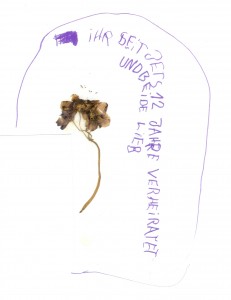by Hanna Vock
A five-year-old girl who is not yet in school but is already reading fluently starts teaching herself how to write.
She uses her writing skills for very different purposes.
The learning process becomes visible on the basis of six documents from the child’s production. The child had the ideas and implemented them alone.
Later, a test revealed giftedness.
(Please click on the pictures to enlarge them. Return to the original size with the arrow button at the top left.)
1. the greeting card
The girl is 5;11 and congratulates her parents on their wedding day. She pressed and glued on a usama violet.
IHR SEIT JETZ 12 JAHRE VERHEIRATET UND BEIDE LIEB. –
〈You´ve been married for 12 years now, and you´re both sweet.〉
In case of doubt, she writes by hearing.
This sometimes works well, for example with „BEIDE“ 〈both〉“, but sometimes it also leads to errors, as with „SEIT“ 〈since〉 instead of „SEID“ 〈are〉 and „JETZ“ instead of „JETZT“ 〈now〉.
Through the early and violent reading, however, she already knows how to spell several words correctly whose spelling cannot be heard exactly – for example „IHR“ 〈you〉 and „LIEB“ 〈sweet〉.
And she has apparently already remembered that the prefix „ver“ is written with v.
2. the floor plan
This time the girl (5;11) has set herself something else: She draws a floor plan of the apartment. The assignment of the rooms, the paths and directions are almost right. Only the parents‘ room was forgotten.
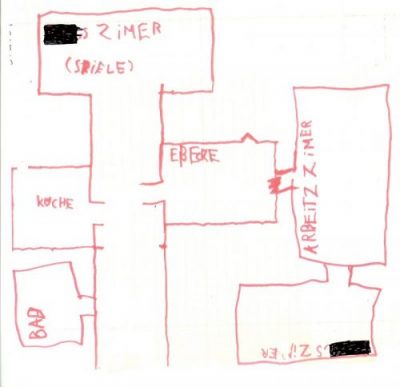
?´S ZIMER (SPIELE) – 〈?´s room〉
KÜCHE – 〈kitchen〉
EßECKE – 〈dining room〉
ARBEITZZIMER – 〈working room〉
BAD – 〈bathroom〉
?´S ZIMER – 〈?´s room〉
She can’t write lowercase yet. It does not (yet) seem necessary to her to learn lower case letters, because the upper case letters are (still) sufficient for her purposes.
This is an indication that it is not important to her to write perfectly, but that she wants to use writing from the beginning to express her ideas.
The motivation to practice writing arises from the pleasure in mental activity, and is intrinsic.
3. the invitation to the 6th birthday
Since both parents worked and the older sister was also on the road a lot, many notification and greeting notes were written and placed on the dining table. The little one (5;11) was very keen to get involved in this practice.
This is one of the first notes the others found:
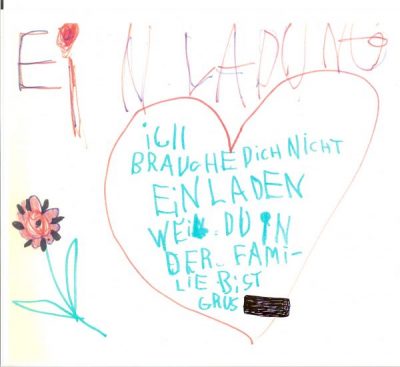
ICH BRAUCHE DICH NICHT EINLADEN WEIL DU IN DER FAMILIE BIST. GRUS … – 〈I don´t need to invite you because you are in the familiy. Greets..〉
The hyphen has already been used here, with you can separate a word so that it fits into a given frame (the heart).
It was needed, so it came to the much-reading girl’s mind. (Best learning by doing.)
The ß was already in use (see above: EßECKE 〈dining corner〉), but was not heard in „GRUS“.
4. the story
With 6;1 the girl writes her own story in kindergarten. She does it secretly („The others were all outside“) and smuggles the cards with the story secretly out of the kindergarten in the lunch box.


ES WAR EINMAL EIN GRAUER LUFTBALON (Luftballon,) DER HATE (hatte) KEINE ELTERN MEHR.
〈It was once a grey air balloon. It had no parents anymore.〉
DA MACHTE ER SICH AUF DEN WEG, UM NEUE ELTERN ZU SUCHEN. DAS FLIEGEN WAR SCHÖN.
〈It set off to find new parents. The flight was beautiful.〉
DOCH PLÖTZLICH BERÜRTE (berührte) ER EIN BLAT (Blatt) UND WURDE GANS (ganz) GRÜN.
〈But suddenly it touched a leaf and turned all green.)
ER FLOG DURCH DIE TÜRKEI (,) KEINE ELTERN SCHWEINEREI!
ER KAM IN DIE DDR (,) HURA (Hurra,) EIN NETTES ELTERNPAR (Elternpaar.)
〈It flew through Turkey, not a parent´s mess!
It came to the GDR (,) hooray, a nice parents.〉
SIE FEIERN GLEICH EIN FEST.
〈They´re about to celebrate a party.〉
The mastery of spelling is still incomplete, the letters are not particularly correctly written, but: The child has the possibility and the courage to express himself creatively with the help of writing.
And that’s the most important thing.
New elements that have been added since the invitation: Strike out, underline, exclamation mark, (what is needed for the drama of the story).
5. the letter
The girl was now 6;4 and still not in school. (She was able to jump from 1st to 2nd grade three weeks after starting school.)
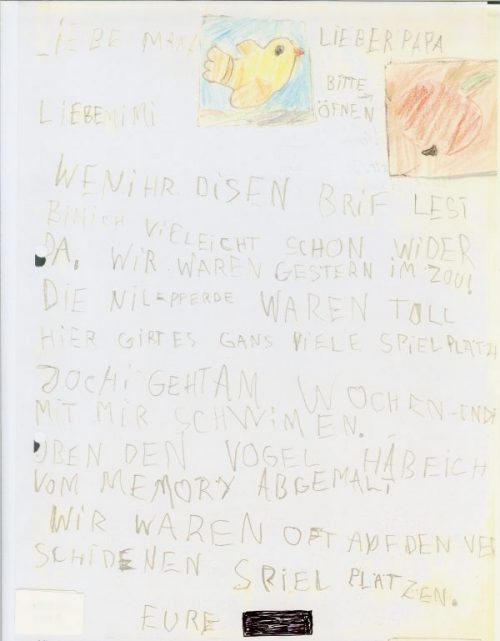
She spent a week alone with friends of the family and wrote the letter without any help.
LIEBE MAMA, LIEBER PAPA,
WEN (Wenn) IHR DISEN (diesen) BRIF (Brief) LEST, BIN ICH VIELEICHT (vielleicht) SCHON WIDER (wieder) DA. WIR WAREN GESTERN IM ZOO! DIE NIL-PFERDE (Nilpferde) WAREN TOLL.
HIER GIBT ES GANS (ganz) VIELE SPIELPLÄTZE. JOCHI GEHT AM WOCHEN-ENDE (Wochenende) MIT MIR SCHWIMEN (schwimmen).
OBEN DEN VOGEL HABE ICH VOM MEMORY ABGEMALT.
WIR WAREN OFT AUF DEN VERSCHIDENEN (verschiedenen) SPIELPLÄTZEN.
EURE…
(Dear Mum, dear Dad,
If you read this letter, I might be back. We were at the zoo yesterday. The hippos were great!
There are a lot of playgrounds here.
Jochi goes swimming with me this weekend.
At the top I painted the bird from the memory (game).
We were often on the different playgrounds.
Yours…)
Here every sentence already has a point at the end.
A lot of things have already been spelled correctly.
Only the strain-E after the I and the doubling of consonants still do not work:
Still: „DISEN BRIF“ – but already: „LIEBER PAPA“,
Still: „VERSCHIEDEN“ 〈different〉 – but already: „HIER“ 〈here〉 and „SPIELPLÄTZE“ 〈Playgrounds〉, „VIELE“ 〈many〉.
Nor: „WEN“ instead of „wenn“ 〈when〉 and „SCHWIMEN“ (schwimmen) 〈swimming〉.
6. the report
Now the girl was 6;10 and in the 2nd grade. She picked up her mother from work after day care and one day she had to wait in the office for a while. She sat down for the first time at a typewriter (which was old, hooked in many places and had long since been discarded).
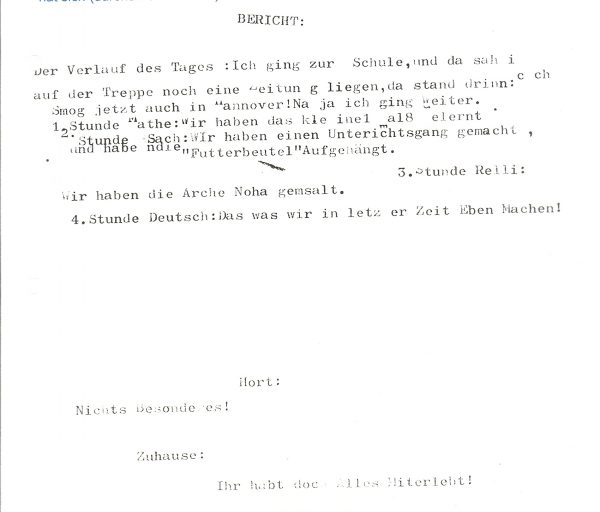
BERICHT:
Der Verlauf des Tages: Ich ging zur Schule, und da sah ich auf der Treppe noch eine Zeitung liegen, da stand drin: Smog jetzt auch in Hannover! Na ja, ich ging weiter.
1. Stunde Mathe: Wir haben das kleine 1 mal 8 gelernt.
2. Stunde Sach: Wir haben einen Unterichtsgang (Unterrichtsgang) gemacht und haben die „Futterbeutel“ Aufgehängt (aufgehängt).
3. Stunde Relli: Wir haben die Arche Noha (Noah) gemsalt (gemalt).
4. Stunde Deutsch: Das was wir in letzter Zeit Eben Machen (eben machen). Hort: Nichts Besonderes!
Zuhause: Ihr habt doch alles miterlebt!
〈REPORT:
The course of the day: I went to school, and then I saw a newspaper lying on the stairs, it said: Smog now also in Hanover! Well, I went on.
First lesson of math: We have learned the small 1 times 8.
2nd hour Subject Expertise: We did a course of instruction and hung up the „food bags“.
3rd hour Religion: We painted the ark Noha (Noah).
4th German lesson: What we’ve been doing lately.
After-school care: Nothing special!
At home: You have witnessed everything!〉
She had learned lowercase and cursive writing in the meantime. But these things interested her only marginally. She was already further along with her thoughts:
The form of the report (writing down something a bit concisely and precisely) was just interesting when this example came into being.
Spelling has evolved through reading books. The punctuation was also enriched by the comma, the colon and the quotation marks.
The entire writing learning process took place independently of the school.
Date of publication in German: June 2012
Copyright © Hanna Vock, see imprint.

